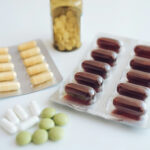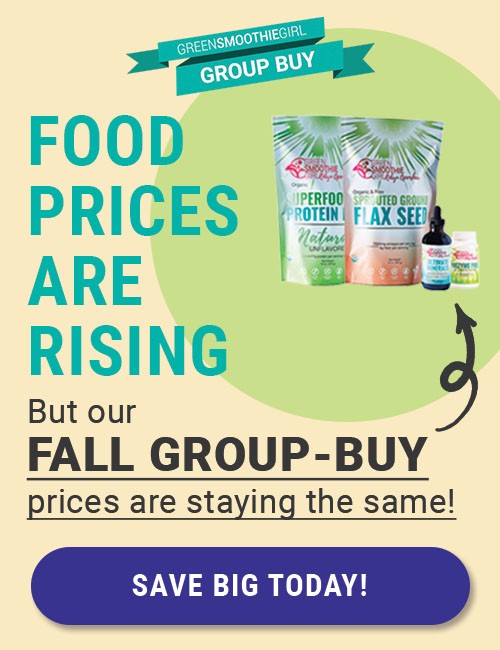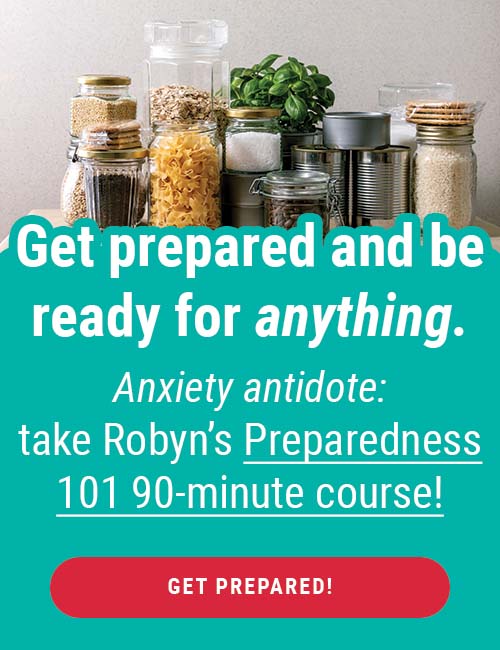How To Fight Depression and Anxiety: 12 Nutrition Strategies

Mental health has its roots in biochemistry, and since food is fuel for our biochemistry, it makes sense that nutrition plays a major role in the stability—or instability—of our mental health.
It certainly has in mine. I was born anxious. Oldest child. Type A. Overachieving list-maker. Red personality (in fact, a redhead—go ahead and apply the stereotype). All of it.
As a young child, I had full-blown, sobbing meltdowns if I got a B on my report card. If I made a mistake in a piano performance. If I let someone down. If someone just didn’t like me.
Opening iTunes every morning even makes me anxious. So many podcasts! I feel stressed that I’m way behind, that I have to Listen To Them All!
I have struggled with crippling anxiety for most of my adult life, but over the past 20 years, I’ve learned how to fight depression and anxiety by managing it, instead of letting it manage me. Not with pills, but with nutrition and the daily choices I make.
My anxiety no longer costs me sleep, makes me cry, or gives me grief. Instead, it fuels my drive to create, learn, and grow.
And the best part? My story isn’t unique. A recent, groundbreaking study showed that people with moderate to severe depression significantly improved their mood just by eating healthier,1. More than 32% were even considered to be in remission after the study.
You can use nutrition to improve your mental health, too.
In this article:
- The Link Between Food and Mental Health
- Is Medication Necessary for Depression?
- The Connection Between Sugar and Depression
- Foods That Help Depression
- How Animal Foods Affect Your Mood
- The Gut-Brain Connection in Depression
- The Role of Raw Foods in Mental Health and Wellness
- Fast Food’s Link to Depression
- Caffeine and Depression
- Healthy Fats Can Improve Your Mood
- Control Your Weight, Control Your Mood
- Herbal, Mineral, and Enzyme Supplements for Depression
- Stop Candida Overgrowth to Restore Gut Balance
- Does pH Balance Affect Mental Health?
The Link Between Food and Mental Health
The connection between how we fuel our bodies through nutrition and how our bodies function is usually reduced to weight loss and weight gain, but think about it—your brain is a physical part of your body, not just a collection of thoughts and feelings.
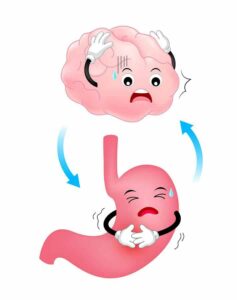
If the food you eat has a direct impact (for better or worse) on your skin, muscles, and bones, it has to have a direct impact on your brain, too. The food we eat has the power to regulate (or wreak havoc) on our hormones, emotional stability, and mental wellness.
On top of the study I mentioned above, this connection is now being explored more in-depth in the emerging field of nutritional psychiatry, which looks at how the food you eat makes you feel and how it affects your gut bacteria, too. (More on gut health later.)
But you don’t have to be a psychiatrist to know how food affects you. Chances are, you already have an idea of how what you eat makes you feel physically, but chipping away at the mental piece takes some dedicated strategy.
My nutritional approach to fighting depression and anxiety isn’t magic. And it isn’t a replacement for medication or your doctor’s advice, but the tips below do work!
Is Medication Necessary for Depression?
If you see what I call a “standard of care” doctor (the type your insurance company pays for), you will most likely get a prescription for a chemical pill. If the pill is successful, it masks your symptoms, at least for a while (keyword being “mask”). It’s kind of like putting duct tape over the warning light in your car’s dashboard.
In our society, the practice of medicine has come to mean “medication.” And if you’re desperate for some relief, you might go there.
If you want pills, go to a standard-of-care doctor. If you want someone to dig deeper to ascertain the root cause and address that first, you’ll want a “functional” practitioner. (A lot of what they do isn’t covered by your insurance, unfortunately, but always check. You can find a functional practitioner at IFM.org.)
The truth is, there’s no such thing as a “pill that treats depression/anxiety.” Pills can treat symptoms of depression or anxiety by doing specific things like increasing your dopamine or serotonin production. But for most people, that chemical or hormonal imbalance is a symptom rather than the cause of their depression or anxiety.
Please don’t misunderstand: For those in the middle of a serious mental health crisis, pills can be lifesavers while you work with a functional practitioner to get to the core cause(s) of the problem. People who fantasize about ending their lives don’t have the wherewithal to sit down and problem-solve when daily life feels so overwhelming. In these cases, medications can be lifesavers—in the short term.
In my opinion, pills shouldn’t be the first line of defense for any sign of trouble, with depression or any other health condition. The side effects of “mainstream” depression and anxiety drugs like Prozac or Zoloft alone can cause a whole new set of problems (weight gain, insomnia, non-existent sex drive, nausea, and increased suicidal thoughts, to name a few). And on top of the side effects, those drugs are very difficult to come off of!
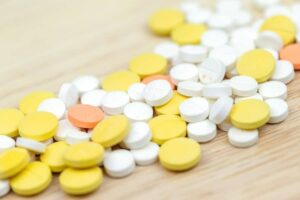
For children and adolescents, the medication approach seems to be mostly backfiring, as certain drugs have low efficacy and are becoming more controversial for the age group2.
Even more troubling, dozens of clinical trials show that pills prescribed for mild and moderate depression and anxiety do not meet the criteria for a “clinically significant effect” (20083, 20104). Most importantly, pills really don’t deal with the root of the problem. Just symptoms.
A whole-body, nutritional approach to anxiety and depression on the other hand? Now you’re talking.
Important: If you are currently taking medication for depression or anxiety, do NOT stop cold turkey, or without the help of a functional health practitioner. The transition ON or OFF medication can be difficult, and support is incredibly important and very much advised.
The Connection Between Sugar and Depression
You definitely don’t want to quit taking antidepressants cold turkey.
Sugar, on the other hand? Cut yourself off. Today. Same goes for high fructose corn syrup (HFCS).
Before I beat my sugar addiction and quit eating sugar for good, except on rare occasions, I noticed that any kind of HFCS (like candy, drinks, and cheap, processed foods) would increase my anxiety for several days. Even a handful of Junior Mints could trigger panic attacks for as long as five days. I’d usually eat sugar when life was hard, when I wasn’t coping well. But that short dopamine rush made things so much worse, heightening my anxiety.
No treat is worth that. Especially for those of us who are susceptible to mood disorders.
Why do sugar and HFCS have such a huge impact on mood? Because low-quality foods high in sugar and refined carbohydrates increase cortisol5 (the “stress hormone”) and place a heavy burden on the adrenal glands. And virtually everyone living in the modern age ALREADY has heavily taxed adrenal glands (think the 24-hour news cycle, parenting and job stress, chemical exposure, etc).
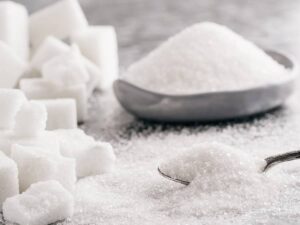
Most packaged drinks and candy have HFCS as a main ingredient. It’s in many breads, condiments, soups, and cereals, too. Not only does HFCS create a heavy drain on your pancreas and liver and make your triglycerides skyrocket, it also causes your insulin to go haywire, which can cause your moods to go haywire6. Over time, this stress and burden takes its toll on your gut health and your mental health.
I’ve got some free tools to make this transition away from sugar easier on you. Take a look at my sugar substitutions chart to know which alternatives to sugar are healthiest and how to use them. You can also print out this wallet card revealing the hidden sugars on food labels to check while you’re shopping, and see my own tried-and-true 6 Easy Swaps to make any recipe healthier—it comes with another free bonus: my Healthy Treats recipe ebook!
Foods That Help Depression
Are you getting enough greens? They contain the most bioavailable minerals of all foods for human beings.
What does “bioavailable” mean? It refers how much of the nutrient is actually utilized by your body, as opposed to how much of that nutrient is in the food. For example, dairy milk is high in calcium, and for baby cows, that calcium is very bioavailable. Cow’s milk is meant to grow a 1,000 pound animal. But for human beings, the calcium in cow’s milk is not bioavailable, nor are we trying to make a fat, 1,000-pound animal by drinking it.
Dairy milk can’t be assimilated properly by humans—in fact, 65% of Americans are lactose intolerant—and dairy products cause the human body to produce mucus as a coping mechanism to flush out the too-large protein molecule.
Most of us are deficient in vitamins, minerals, and nutrients we aren’t even aware of (even if you take a multivitamin). Unless your deficiency is very severe and starts manifesting symptoms, it’s likely to go undiagnosed7. By eating more living foods that are nutrient-dense and bioavailable, you’re going to help your system become more balanced.
Eat vegetables in all the colors of the rainbow, such as:
- Tomatoes
- Bell peppers
- Sweet potatoes
- Carrots
- Squash
- Zucchini
- Celery
- Spinach
- Swiss chard
- Kale
- Watercress
- Arugula
- Romaine and other leafy greens
- Broccoli
- Green peas
- Fennel
- Cabbage
Our digestive tracts are built for a lot of plant food. Unlike carnivores, with a short GI tract straight from mouth to anus, the human GI tract is over 30 feet long, in a windy, twisty, path, and it needs significant plant fiber (not Metamucil!) to move things through and keep our colon, and therefore our blood, clean.
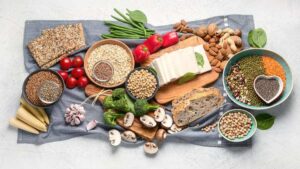
In a study published in my book The Green Smoothies Diet, fully half of the 175 respondents said adding green smoothies to their diet (at least two cups, at least four times a week) improved the stability of their mood.
How Animal Foods Affect Your Mood
It’s pretty simple: We thrive (mentally and physically) on a diet that is high in plant material and low in animal products.
- Our digestive tracts were built to handle primarily plant material. The nutrients and minerals in plants are easier for us to absorb than those in animal foods, and they are the best material for maintaining a healthy microbiome in our guts (more on the importance of this next).
- Heavily processed animal foods contain harmful ingredients. If you do eat meat, please ensure that it’s from a clean source (wild-caught, organically-farmed, pasture-raised, or grass-fed). Never eat processed meat or dairy. These meats are full of chemicals and hormones (including estrogen and steroids)8 with the potential to affect mood disorders (not to mention increase the risk of some cancers).
- Animal products are inferior to nutrition from plants. While meat and eggs provide protein, choline, essential fatty acids, and Vitamin B12, these foods are devoid of fiber and lacking in most micronutrients, so even if you eat some animal products, the bulk of the diet should always be unprocessed plant foods.

I haven’t eaten pork or beef in 25 years, and I don’t eat sushi or raw or farmed fish, either. I get plenty of protein and calories eating legumes like split peas, lentils, and pinto, kidney, and navy beans. I also like hearty, gluten-free, organic grains like oats, quinoa, buckwheat, millet, brown rice, and amaranth.
The Gut-Brain Connection in Depression
The health of your gut is so strongly linked to the health of your brain, it’s sometimes called a “second brain.”9 It contains more than 100 million neurons, and when it’s in distress, so are you.
Your gut is responsible for generating a whopping 95% of your serotonin and 50% of your dopamine10, as well as melatonin and adrenaline. Any psychologist will tell you that all of those neurochemicals are crucial for mental stability and feelings of wellness and happiness.
A recent study showed that the simple act of taking a quality probiotic significantly improved depression.11 How? Your gut contains between three and five pounds of bacteria. In a healthy gut, most of that is friendly bacteria, regulating hormones, removing waste, and controlling inflammation. If there’s an imbalance between the friendly and harmful bacteria, mental and physical problems crop up.
Taking a probiotic/prebiotic supplement is a great way of adding more “friendlies” and rebalancing your “second brain.”
The Role of Raw Foods in Mental Health and Wellness
Are you eating 60–80% raw or better? I’m talking about uncooked greens, vegetables, fruits, nuts and seeds, sprouts, etc. While 100% raw isn’t necessary or even ideal, a diet high in unprocessed, raw plant foods gives you the highest nutrient quality and enzymes that improve your higher mental functions.
There’s a huge leap between 100% raw and 80% raw, and there are plenty of die-hards that insist it’s 100% raw or bust. But some foods are healthy and beneficial raw, while others can be difficult or impossible to eat in raw form. I eat cooked soups made with vegetables, legumes, nuts and seeds. I also eat lots of raw foods in the form of green smoothies, vegetable juice, salads, and just snacking on carrots, bell peppers, etc.
Count the percentage of your raw foods in the bulk of your diet, or count it in calories (60–80%), you don’t have to be super precise—but eat a primarily raw, plant-based diet. If you need help getting started, I’ve got a free 12 Steps to Whole Foods video masterclass; it’ll give you all the basics for the simplest, fastest track to ease you into the changes that will make a radical difference in your physical and mental health.
Fast Food’s Link to Depression
How often are you using the fast-food drive-thru? Virtually everything sold there (high in calories, high in sugar, processed, low in nutrition) puts you at higher risk for depression and anxiety.
Most other products you find in a drive-thru are heavily processed and filled with preservatives for maximum shelf life. In other words, they’re denatured, and your body has to work excessively to digest them.

This imbalance in your gut takes energy away from higher neurological functions, because when your body is funneling a lot of energy towards digestion and wrangling unnatural, unhealthy foods, that’s energy that isn’t freed up for your mental reserves. Again and again, new research shows the strong connection between gut health and brain function.12
Possibly the worst thing coming out of the drive-thru are toxic, heavy fats like trans fats, which are difficult to metabolize (in some cases impossible to metabolize) and cause cellular damage.
The fried foods you buy in the grocery store have got to go, too. Chips, gone. Please.
Caffeine and Depression
You love your coffee. But does your coffee love you? Maybe not as much as you might hope. Non-organic coffee is one of the most heavily sprayed crops in the world, and the roasting process produces the carcinogen acrylamide13—the same toxin found in fried foods like chips and french fries.
Try to cut your coffee intake down to an occasional indulgence rather than a twice-a-day habit, and when you do drink coffee, make sure it’s organic and free from a high chemical load. A few brands claim to be much less acidic than your typical blend.
While you’re making the switch to organic and cutting down on your consumption, make sure you also pay attention to what’s going into your coffee. Sugar, heavily-processed and chemical-laden creamers, and artificial sweeteners are bad news for your mental and physical wellness.
You already know why you should toss sugar and chemicals, but why are artificial sweeteners so bad? Aside from tricking your brain into thinking it’s getting energy in the form of calories (then not getting any because you’re eating a calorie-free sweetener), artificial sweeteners can alter your gut bacteria—and not in a good way14.
Use organic coconut milk or almond milk for creamer, and natural, organic sweeteners like stevia for sweetness that doesn’t spike your blood sugar.
[Related:3 Ways To Make Your Coffee Healthier]
Healthy Fats Can Improve Your Mood
Are you getting enough essential fatty acids? A whopping 90% of Americans are deficient in omega 315. Many studies link deficiency to major depression16, since you must have omega-3 to break down and transmit the “happy hormones” serotonin, epinephrine, and dopamine.
And it’s not just the lack of omega-3 that’s the problem. It’s the excesses of omega-6, found in refined oils like fried foods, chips, etc. Most Americans are getting the bulk of their fatty acids from omega 617 and only a tiny percentage from omega 3.
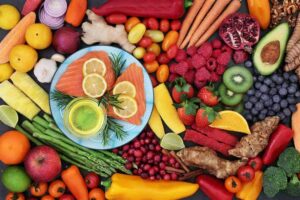
Why is this a problem? We need an even balance of omegas, but in the Standard American Diet, the ratio is an average of 16:1 in favor of omega-618. This causes inflammation in the body and can lead to numerous health problems, so the more omega-3s we can get in our diet to bring down that inflammation, the better.
To add more healthy omega-3 into your diet, enjoy walnuts or walnut oil in your meals, or add a couple tablespoons of chia, flax, and/or hemp seed in your diet. The sprouted varieties of these seeds are more bioavailable than the plain seed or seed oils, and adding sprouted flax powder to a green smoothie is one of the quickest and best ways to boost your omegas.
[Related: 15 Ways To Use Sprouted Flaxseed]
Control Your Weight, Control Your Mood
There’s a clear link between obesity and depression.19
Extra weight heavily taxes the endocrine system (hormones), and imbalances of hormones are a primary cause of depressed feelings, which make it hard to problem-solve life circumstances. This imbalance can, in turn, contribute to more weight gain—so it’s a vicious cycle!
The clear path to getting rid of extra weight is to eliminate white flour and sugar. I promise that you will not miss them like you think you will. Even if you have a lot of weight to lose, don’t despair. I’ve been there. You can do this.
There’s no need for obsessive calorie counting and appetite suppression, either. When you eat 8–10 raw fruits and vegetables every day, cut out the fast food, add in whole grains, nuts, and good fats, you’re going to decrease your unhealthy cravings immensely and heal your metabolism, too.
Herbal, Mineral, and Enzyme Supplements for Depression
Again, if you are taking SSRIs or other medications for depression and anxiety, consult your doctor before stopping your medications or adding any herbal or supplement therapies. Adverse reactions can occur when using both Prozac (for instance) and some natural treatments. A few supplements can also interact with contraceptive pills or other medications. Always check with your medical practitioner first.
The following are the most well-known and well-studied herbs, minerals, and enzymes that improve depression and anxiety:
- St. John’s Wort is helpful for depression, with at least 10 active constituents involved in that intervention, including hypericin and pseudohypericin. It’s believed to work in part by increasing the activity of neurotransmitters like serotonin and norepinephrine. Studies have found that it’s as effective as antidepressants20 for mild to moderate depression, with fewer side effects.
- Kava is a heavily-studied herbal supplement for anxiety, as well as insomnia. Kava affects GABA-receptor-binding capacity and blocks norepinephrine uptake. Studies have found it to have effects equal to benzodiazepines21, but without side effects. It’s important to understand that, like ibuprofen, liver damage can take place if it’s used excessively or improperly.
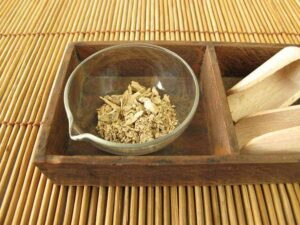
- Fulvic Acid: Modern agricultural processes have depleted a lot of key minerals in the soil, meaning, they don’t get into the produce we eat. These trace minerals are so important to hormone regulation and mood! Supplementing with a fulvic acid mineral supplement can help improve mood, regulate sleep-wake cycles, improve adrenal function, and reduce inflammation.
- Enzymes: Enzymes help the nutrients and minerals you eat get from point A (your mouth) to point B (your cells). Taking an enzyme supplement helps make sure you’re actually able to use the good stuff in the foods you’re eating.
- L-tryptophan, or 5-hydroxytryptamine (5-HTP): This supplement’s function is to increase beta-endorphins, your “feel-good” hormones. A typical dose of 5-HTP is 200 mg per day, and it can be found online or in health food stores.
- B-Complex vitamins and methylfolate can also be extremely helpful in regulating mood for people who are deficient.
Stop Candida Overgrowth to Restore Gut Balance
Yeast overgrowth (most commonly candida) is more common than most people think. For years, the holistic health community has linked yeast infection and overgrowth to depression and other mental illness, and numerous studies now back that anecdotal evidence.
A diet high in sugar and heavily-processed foods, especially during and following antibiotic use, is the perfect environment for the candida fungus to grow out of control in the digestive tract and cause all sorts of problems. One of those problems: difficulty absorbing different nutrients. The “second brain” in your gut can’t work properly with a massive yeast overgrowth.
Cut out sugar (sugar feeds yeast), try to avoid alcohol, minimize fermented foods while you starve out candida, and take a broad-spectrum probiotic/prebiotic/enzyme to restore that crucial balance in your gut.
Does pH Balance Affect Mental Health?
A healthy body leans toward alkaline. Unfortunately, most of us lean slightly acidic. Hyper acidity is caused by stress, and by eating acidic foods like soda, animal proteins, dairy products, coffee, and sugar and flour products. That acidity leads to chronic inflammation and distress in all of the body’s tissues, including the brain and the gut.
Researchers have found that an acidic brain is not only linked to impaired cardiovascular function and kidney failure, but mental health problems as well22.
The blood will ALWAYS maintain its pH, within a very narrow range, or we die. So if we’re eating too many acidic foods, or toxins and chemicals that upset our pH, the blood robs minerals of cells, tissues, and other organs to maintain that proper blood balance.
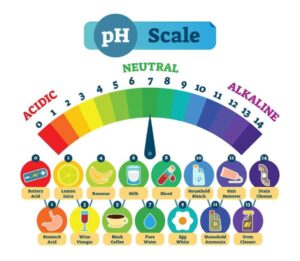
Balancing our pH involves eating a lot of alkaline foods like leafy greens, crucifers like cauliflower and broccoli, vegetables like sweet potatoes, carrots, peppers, onions, and more; nuts and seeds like brazil nuts, almonds, cashews, sesame and sunflower seeds; and legumes like split peas, lentils, and kidney, black, or navy beans. Drinking alkaline water, with a water ionizer, is another fantastic way to quickly shift your body’s ph.
Speaking of water, do you feel like you just took a drink out of a fire hydrant? Shifting to a holistic health paradigm for dealing with mental and physical health can feel daunting at first. But when the only side effects you have are increased energy, stable moods, and a healthy digestive system, I can promise you it’s worth it to take some steps and find out which ones work for you.
Start with one or two of these tips, and make them into habits. Then add another. And another.
The impact to your mental and physical health will literally be life-changing.
Watch: I discuss more natural remedies, coping mechanisms, and strategies for how to deal with anxiety and depression in this video.

Disclosure: This post may contain affiliate links that help support the GSG mission without costing you extra. I recommend only companies and products that I use myself.
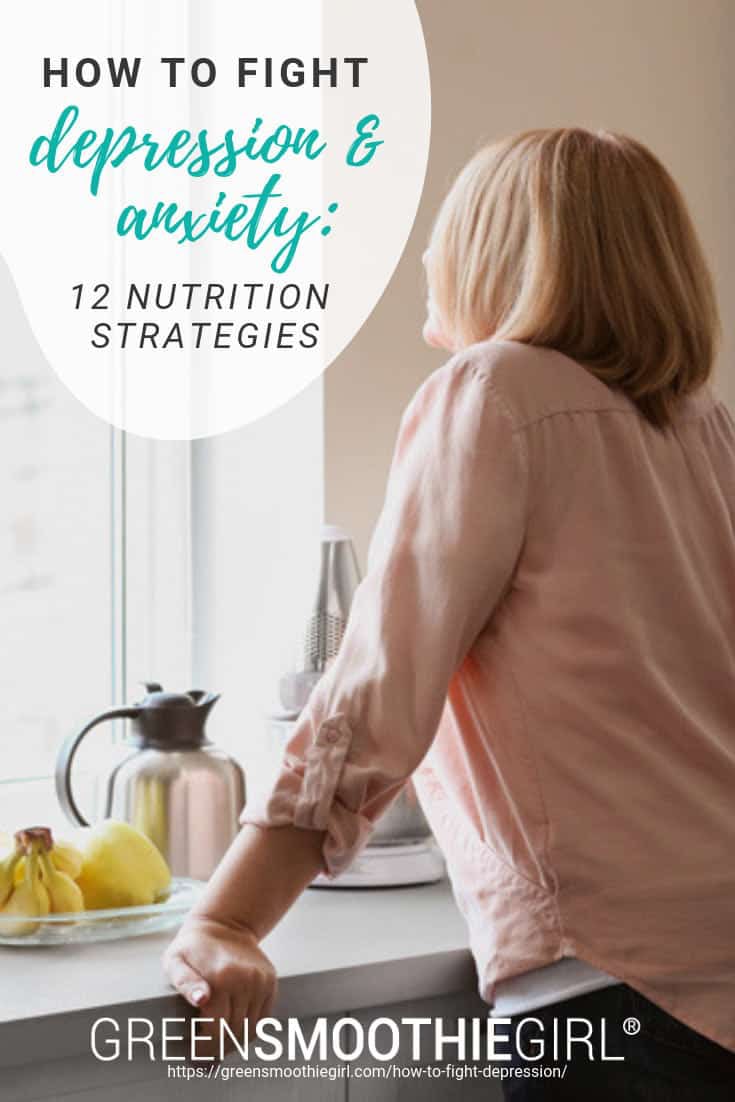
Sources
- Jacka F, O’Neil A, Opie R, et al. A randomized controlled trial of dietary improvement for adults with major depression (the ‘SMILES’ trial). BMC Medicine. 2017; 15(1):23.
- Cipriani A., Zhou X., Del Giovane C., Hetrick S.E., Qin B., Whittington C., et al. Comparative efficacy and tolerability of antidepressants for major depressive disorder in children and adolescents: a network meta-analysis. The Lancet. 2016; Volume 388, Issue 10047, 881–890.
- Kirsch I., Deacon B. J., Huedo-Medina T. B., Scoboria A., Moore T. J., & Johnson B. T. (2008). Initial severity and antidepressant benefits: A meta-analysis of data submitted to the Food and Drug Administration. PLoS Medicine, 5, e45 doi: 10.1371/journal.pmed.0050045
- Fournier J. C., DeRubeis R. J., Hollon S. D., Dimidjian S., Amsterdam J. D., Shelton R. C., & Fawcett J. (2010). Antidepressant drug effects and depression severity: a patient-level meta-analysis. Journal of the American Medical Association, 303, 47–53. doi: 10.1001/jama.2009.1943
- Duong M, Cohen JI, Convit A. High cortisol levels are associated with low quality food choice in type 2 diabetes. Endocrine. 2012;41:76–81.
- Gonder-Frederick La C. D., Bobbitt S. A., Pennebaker J. W. (1989). Mood changes associated with blood glucose fluctuations in insulin-dependent diabetes mellitus. Health Psychol. 8, 45–59 10.1037/0278-6133.8.1.45
- Griffiths, Jeffrey K. Vitamin Deficiencies. Hunter’s Tropical Medicine and Emerging Infectious Disease (Ninth Edition), 2013.
- MALEKINEJAD H, REZABAKHSH A. Hormones in Dairy Foods and Their Impact on Public Health – A Narrative Review Article. Iranian Journal of Public Health. 2015;44(6):742-758.
- Cytowic, Richard E. M.D. The Pit In Your Stomach is Actually Your Second Brain. Psychology Today. January, 2017.
- Evrensel A, Ceylan ME. The Gut-Brain Axis: The Missing Link in Depression. Clinical Psychopharmacology and Neuroscience. 2015;13(3):239-244. doi:10.9758/cpn.2015.13.3.239.
- Maria Ines Pinto-Sanchez, Geoffrey B. Hall, Kathy Ghajar, Andrea Nardelli, Carolina Bolino, Jennifer T. Lau, Francois-Pierre Martin, Ornella Cominetti, Christopher Welsh, Amber Rieder, Jenna Traynor, Caitlin Gregory, Giada De Palma, Marc Pigrau, Alexander C. Ford, Joseph Macri, Bernard Berner, Gabriela Bergonzelli, Michael G. Surette, Stephen M. Collins, Paul Moayyedi, Premysl Bercik. Probiotic Bifidobacterium longum NCC3001 Reduces Depression Scores and Alters Brain Activity: a Pilot Study in Patients With Irritable Bowel Syndrome. Gastroenterology, 2017; DOI: 10.1053/j.gastro.2017.05.003
- Gómez-Pinilla F. Brain foods: the effects of nutrients on brain function. Nature Reviews Neuroscience. 2008;9(7):568-578. doi:10.1038/nrn2421.
- Çebi A. Acrylamide Intake, Its Effects on Tissue and Cancer. In: Gökmen V, editor. Acrylamide in Food. Analysis, Content and Potential Health Effects.London: Academic Press, 2016.
- Harpaz D., Yeo LP, Cecchini F, Koon THP, Kushmaro A, Tok AIY, Marks RS, Eltzov E. Measuring Artificial Sweeteners Toxicity Using a Bioluminescent Bacterial Panel. Molecules 2018, 23(10), 2454; doi:10.3390/molecules23102454
- Papanikolaou Y, Brooks J, Reider C, Fulgoni VL. U.S. adults are not meeting recommended levels for fish and omega-3 fatty acid intake: results of an analysis using observational data from NHANES 2003–2008. Nutrition Journal. 2014;13:31. doi:10.1186/1475-2891-13-31.
- Logan AC. Omega-3 fatty acids and major depression: A primer for the mental health professional. Lipids in Health and Disease. 2004;3:25. doi:10.1186/1476-511X-3-25.
- Blasbalg TL, Hibbeln JR, Ramsden CE, Majchrzak SF, Rawlings RR. Changes in consumption of omega-3 and omega-6 fatty acids in the United States during the 20th century. The American Journal of Clinical Nutrition. 2011;93(5):950-962. doi:10.3945/ajcn.110.006643.
- Simopoulos AP. Evolutionary aspects of diet, the omega-6/omega-3 ratio and genetic variation: nutritional implications for chronic diseases. Biomedicine & Pharmacotherapy. Volume 60, Issue 9, November 2006, Pages 502-507.
- Floriana S. Luppino, Leonore M. de Wit, Paul F. Bouvy, Theo Stijnen, Pim Cuijpers, Brenda W. J. H. Penninx, Frans G. Zitman. Overweight, obesity, and depression: a systematic review and meta-analysis of longitudinal studies. Arch Gen Psychiatry. 2010 Mar; 67(3): 220–229. doi: 10.1001/archgenpsychiatry.2010.2
- Wiley-Blackwell. “St. John’s Wort Relieves Symptoms Of Major Depression, Study Shows.” ScienceDaily. 13 October 2008.
- Pittler MH, Ernst E. Kava extract for treating anxiety. The Cochrane Database of Systematic Reviews. 2003;Issue 1:Article. no. CD003383.
- Rucklidge, Julia J. “Could Yeast Infections Impair Recovery From Mental Illness? A Case Study Using Micronutrients and Olive Leaf Extract for the Treatment of ADHD and Depression.” Adv Mind Body Med. 2013 Summer;27(3):14-8.
Posted in: 12 Steps To Whole Food, Emotional Health, Health Concerns, Mind/Body Connection, Natural Remedies, Stress Management, Whole Food








